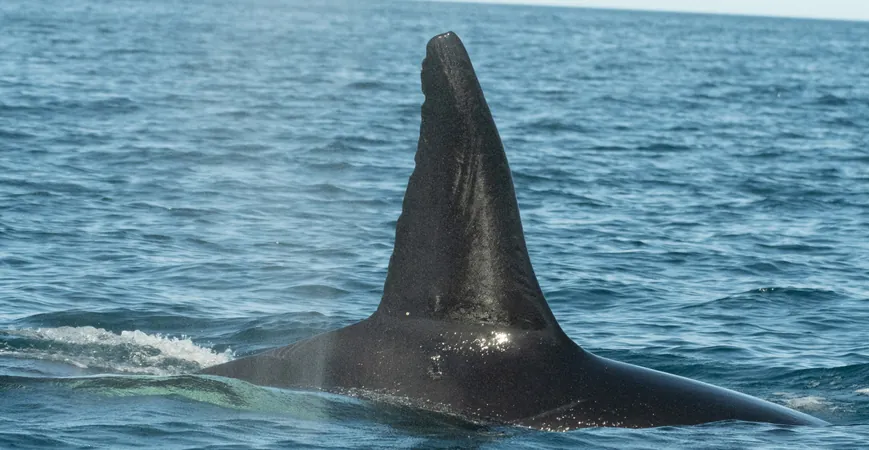
Mysterious Orca Pod Develops Unique Hunting Techniques for Whale Sharks—Could This Change Marine Ecosystems?
2024-11-29
Author: Jacob
Introduction
In a stunning revelation from the Gulf of California, researchers have uncovered that a pod of killer whales, or orcas, may have developed specialized skills to hunt the majestic whale sharks— the largest fish on the planet, reaching lengths of up to 18 meters. This remarkable adaptation could have profound implications for marine ecosystems and the delicate balance of oceanic life.
Unusual Hunting Strategies
Killer whales are known for their diverse diet, which typically includes marine mammals, turtles, and various fish. However, recent observations suggest that this particular pod has learned to orchestrate collaborative hunting strategies specifically targeting whale sharks, especially younger ones that are more vulnerable. The hunting techniques were documented in a series of four noteworthy predation events from 2018 to 2024.
Observations and Insights
"In our study, we detail how these orcas employ synchronized hunting methods, often concentrating on the pelvic area of the whale shark. This tactic causes the shark to bleed out, making it easier for the orcas to access the nutrient-rich liver," explains Erick Higuera Rivas, a marine biologist at Conexiones Terramar and lead author of the research published in Frontiers in Marine Science.
The Role of Individual Orcas
Among the notable orcas observed during these hunts was a male named Moctezuma, who participated in three out of the four recorded events. The presence of a female orca—potentially related—alongside Moctezuma suggests a tight-knit family unit specialized in this extraordinary form of predation.
A Unique Hunting Technique
The hunting technique follows a fascinating pattern: the orca pod collaborates to incapacitate the whale shark by flipping it upside down, inducing a state called tonic immobility, which leaves the shark unable to swim or escape. By mastering this strategy, the orcas can easily target the shark's vulnerable pelvic region, allowing them to consume vital organs essential for their diet. The observations reveal the incredible intelligence these marine mammals exhibit in their hunting methods.
Concerns for Whale Sharks
However, while these predation events highlight the evolving behavior of orcas, they also raise critical questions about the future of whale sharks. As these gentle giants are already endangered due to fishing and habitat loss, orca predation could pose additional challenges to their survival. Moreover, with the ongoing impacts of climate change affecting marine ecosystems, researchers are concerned about the possible decline in whale shark populations, which could leave orcas vulnerable as well.
Research Challenges
The pursuit of understanding these adaptations is not without challenges. Capturing accurate data on orca hunting behavior is complex; attacks are unpredictable, and obtaining high-quality images or videos can be difficult. Regardless, the finding underscores the imperative need for sustainable management of marine activities and the tourist industry in the Gulf of California to protect these creatures and their habitats.
Conclusion
"There must be strict regulations ensuring that non-extractive activities related to marine life are carried out with respect and sustainability in mind," Higuera Rivas emphasized.
As researchers delve deeper into the intricate relationship between orcas and whale sharks, their ongoing studies aim to illuminate the unique adaptations and ecological knowledge these apex predators possess. "The strategic and intelligent way orcas work together is truly extraordinary and highlights their prowess as apex predators," concludes Higuera Rivas.
In a world where climate change continues to reshuffle marine life dynamics, understanding these orca hunting techniques could be the key to ensuring both their survival and the protection of whale sharks—the gentle giants of the deep. Are we witnessing the dawn of a new hunting age in our oceans? Only time will tell.









 Brasil (PT)
Brasil (PT)
 Canada (EN)
Canada (EN)
 Chile (ES)
Chile (ES)
 España (ES)
España (ES)
 France (FR)
France (FR)
 Hong Kong (EN)
Hong Kong (EN)
 Italia (IT)
Italia (IT)
 日本 (JA)
日本 (JA)
 Magyarország (HU)
Magyarország (HU)
 Norge (NO)
Norge (NO)
 Polska (PL)
Polska (PL)
 Schweiz (DE)
Schweiz (DE)
 Singapore (EN)
Singapore (EN)
 Sverige (SV)
Sverige (SV)
 Suomi (FI)
Suomi (FI)
 Türkiye (TR)
Türkiye (TR)